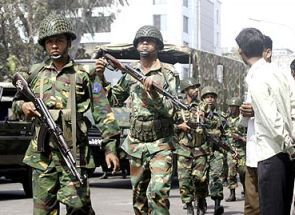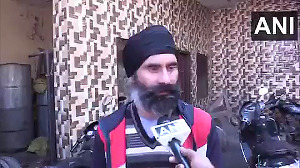
A total of 152 Bangladeshi soldiers were sentenced to death by a special court in Dhaka on Tuesday in one of the world's biggest ever mass criminal trials for their role in a 2009 mutiny and massacre of 74 people, including top army officers.
A total of 820 ex-paramilitary soldiers and 26 civilians were put on trial and Dhaka metropolitan sessions court judge Md Akhtaruzzaman gave life imprisonment to 158 rebel soldiers and jail terms of three to 10 years to 251 others, while 271 were acquitted.
Touhid Ahmed, former deputy assistant director of the Bangladesh Rifles, now known as Border Guard Bangladesh, was among those given capital punishment. He was the key leader of the mutineers.
"They will be hanged by neck until they are dead," the judge announced to a packed courtroom after a trial that lasted 34 months.
"The atrocities were so heinous that even the dead bodies were not given their rights," justice Akhtaruzzaman said.
Maj Gen Aziz Ahmed, Director General of BGB, expressed satisfaction over the verdict. "The justice has been meted out... the families which lost their close relatives and the people like us who lost their colleagues and friends will get some consolation," he said.
"The perpetrators of the 2009 mutiny have been given a proper and exemplary punishment after a long trial," Ahmed told reporters.
Tight security was put in place around the makeshift court complex on the ground of a madrassa in Old Dhaka as the accused were brought in vans from the nearby Central Jail.
They heard the judgement from a huge caged dock.
The paramilitary border guards staged a two-day mutiny over pay and other grievances against military leaders during February 25-26, 2009. The mutiny took place two months after Prime Minister Sheikh Hasina assumed office.
Then BDR chief Major General Shakil Ahmed was among those killed and the mutineers hacked to death, tortured and burnt alive 74 people whose bodies were dumped in sewers and shallow graves in Dhaka.
During the uprising at BDR headquarters, the mutineers stole 2,500 weapons, broke into a meeting of top officers and shot them at close range.
Among the civilians given life terms were former BNP lawmaker Nasiruddin Ahmed Pintu, an Awami League leader and ex-BDR soldier Torab Ali, who were found guilty of collaborating with the mutineers.
The convicts returned to prison under tight security while relatives of the victims and convicts crowded the court complex along with hundreds of onlookers as Rapid Action Battalion troops surrounded the area.
Prosecution lawyers said they would decide soon on challenging the acquittal of 242 soldiers in the high court but added that it appeared unlikely.
"It is possibly one of the biggest criminal trials in the world in terms of the number of accused, witnesses and the people killed... it is unique that they got a normal trial under the ordinary law of the country," chief prosecutor Anisul Huq told PTI.
Court officials said out of over 1,300 witnesses, 655 prosecution and 27 defence witnesses testified in court. The formal trial ended on October 20.
Dhaka's then sessions Judge Johurul Haque initiated the trial on January 5, 2011 under a massive campaign to overcome the stigma of the mutiny.
The rebel soldiers staged the mutiny at BDR's headquarter in the heart of the capital but the unrest quickly spread to sector headquarters and regional units across the country.
The rebellion saw paramilitary soldiers turn their guns on their commanders, shooting them from close ranges or hacking and torturing them to death, hiding their bodies in sewers and hurriedly dug graves and humiliating their frightened family members in barracks.
The rebels went on a killing spree during the 33-hour revolt, when they also murdered then Dhaka sector chief Col Mojibul Haque and dumped the bodies of army officers in sewers and shallow graves.
The mutiny exposed Prime Minister Hasina's government to its worst challenge just a month after it was elected.
In November last year, Bangladesh concluded a major phase of the trial of the rebellion when 11 paramilitary courts delivered verdicts against 57 mutinying units, sentencing a total of 6,011 rebel soldiers to terms of up to seven years in prison under the relatively lenient BDR act.









 © 2025
© 2025